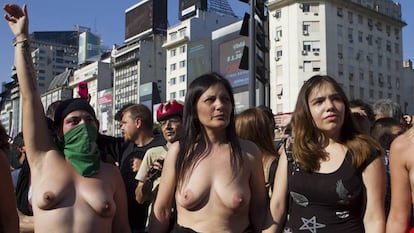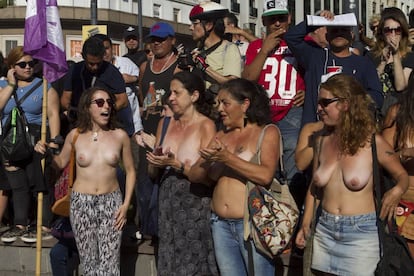Hundreds of women stage mass topless protest in Buenos Aires
March follows beach incident when 20 police threatened three with arrest for showing their breasts

Anybody who doubted that machismo was alive and well in Argentina need only have visited central Buenos Aires on Tuesday afternoon. Around a dozen women who had taken their tops and bras off as part of a protest to demand the legalization of topless bathing were attracting an ever-growing crowd of goggle-eyed men, some of whom were going to extreme lengths to get a view of the women’s naked torsos, even climbing up flagpoles. Amid the chaotic scene, the women shouted: “Machos keep away!”
The situation was soon out of control, with one of the women setting upon a man who was trying to take her photograph, while fighting broke out between men supporting the women and those intent on staring at them. One man approached the women and exposed himself, prompting further outrage. Eventually more women turned up, and pushed away all the men around them, including journalists.
All this in 2017 in one of Latin America’s most advanced nations, and in one of the world’s most culturally active cities.
The protests were in response to an incident on January 28, when police were called to Necochea, a popular beach in Buenos Aires, by some bathers who were outraged that a group of women had taken their bikini tops off.
Society still can’t deal with tits as something natural Carolina, a protester at the demonstration
The incident was filmed and later went viral on social networks. It shows police initially trying to persuade three women to cover themselves up and eventually calling in reinforcements as more and more people gathered round, with some expressing their support for the women and others calling for them to be arrested for indecency.
Eventually, some 20 officers arrived at the scene, and, threatened with arrest and handcuffs, the women left the beach.
But when the three appeared before a magistrate a few days later, the judge not only threw the charges of offending public decency out, he said that the legislation in Buenos Aires province that had been cited dated back to 1973 and was anti-constitutional, and called on legislators to overturn it.
Meanwhile, the case had generated huge interest on the social networks as well as in the media, and a so-called tetazo (literally, “big tit”) protest march was arranged for Tuesday at the Plaza de la República in central Buenos Aires.

Dozens of women gathered around the square’s landmark Obelisk and took their tops off, demanding the same rights as men to sunbathe topless. In Argentina, as in much of Latin America and the United States, half-naked women are a permanent feature of advertising and television, but any kind of female nudity is taboo, even on beaches.
“We demand our right to decide about our bodies. This demand isn’t just about going topless, but about the bigger issue of inequality between men and women,” said Julieta, a university student at the demonstration who had painted “The pleasure of breaking macho ties” across her chest.
“Society still can’t deal with tits as something natural,” added Carolina. “It is incredible that a topless woman on a beach or a mother breastfeeding her baby causes a scandal in this day and age.”
“It was logical that men were going to come, half of them are peeping Toms, and that is why so few women are prepared to take their tops off,” she said at the beginning of the demonstration, when there were more gawping men than female protesters.

But an hour later, hundreds of women had taken over the area around the Obelisk and even some of the surrounding streets, where they danced and sang, painting their bodies with slogans. The only men allowed into the women’s midst were those prepared to put on a bra to cover themselves up.
In the run up to the protest, several women posted videos on social networks attacking what they see as Argentina’s archaic laws and deep-rooted male dominance, as well as traditions about the role of women in society. Congresswoman Victoria Donda, whose parents were disappeared by the military dictatorship that ran the country between 1976 and 1983, said she would be attending the tetazo. “If a law is passed preventing women from going topless on beaches, I will propose a law obliging men to wear a bra,” she said. But this merely prompted speculation as to whether Donda would also go topless in public.
The issue has certainly divided Argentinean society, and has sparked a long-overdue debate. But even some of those who support a change in the law have pointed out that in a country mired in economic crisis and with rising poverty levels – not to mention an alarmingly high murder rate of women, one every 30 hours – going topless on the beach is arguably one of the country’s least-pressing priorities.
English version by Nick Lyne.
Tu suscripción se está usando en otro dispositivo
¿Quieres añadir otro usuario a tu suscripción?
Si continúas leyendo en este dispositivo, no se podrá leer en el otro.
FlechaTu suscripción se está usando en otro dispositivo y solo puedes acceder a EL PAÍS desde un dispositivo a la vez.
Si quieres compartir tu cuenta, cambia tu suscripción a la modalidad Premium, así podrás añadir otro usuario. Cada uno accederá con su propia cuenta de email, lo que os permitirá personalizar vuestra experiencia en EL PAÍS.
¿Tienes una suscripción de empresa? Accede aquí para contratar más cuentas.
En el caso de no saber quién está usando tu cuenta, te recomendamos cambiar tu contraseña aquí.
Si decides continuar compartiendo tu cuenta, este mensaje se mostrará en tu dispositivo y en el de la otra persona que está usando tu cuenta de forma indefinida, afectando a tu experiencia de lectura. Puedes consultar aquí los términos y condiciones de la suscripción digital.








































